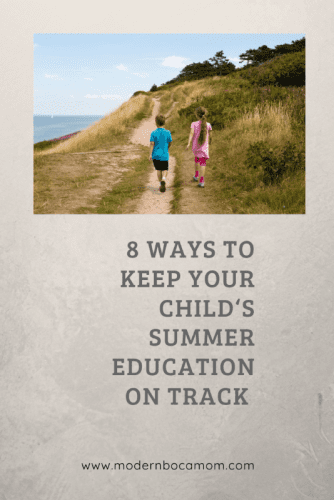Looking for some tips to keep your kids engaged in learning until the next school year begins? We reached out to Aileen Palmer, Director of Operations at Grandview Preparatory School, for some ideas on how to keep your child’s summer education on track. Here’s what she personally had to say…

As a full time teacher and mother of three, I have found that summer is not only a great time to play, but also teach and learn with my own children. You do not have to be an educator in order to make summertime learning a reality. And, there is no need to spend hundreds of dollars or invest a ton of time in planning.
Summer should be as stress free as possible…
Here are a few everyday activities you can turn into learning opportunities to keep your child’s summer education on track:
1. Take a walk around your neighborhood
Your walk (preferably once the hot sun goes down) can now become a safari expedition! See how many animals you can spot. Talk about what they eat and their habitats. This can lead to a discussion about the food chain, predator-prey interactions, habitats and ecosystems.
Be the one to ask questions! For example:
- What animals do you think live in a tree?
- Why do you think this is a good habitat for the animals?
- What do you think the animals eat?
- If we were to remove a certain animal, how would it change the food chain and ecosystem?
By the time you finish your 15 minute safari expedition around the neighborhood, you have completed a science lesson, sparked interest, made a healthy choice and enjoyed a conversation with your child that did not include the words, “I’m bored!” or “Can I play with the iPad?”
2. Transform a trip to the beach into Art and Math 101

Collect shells and sort them by size, color and texture. Build a sand castle. Challenge your child to build one as tall as they can. Create an artistic masterpiece in the sand. Become a beach-side Picasso for the afternoon. Ask your child to make a drawing in the sand using as many shapes as possible. For younger children, ask them to use basic shapes such as circles, squares and triangles. With older children, ask them to use more complex shapes such as rhombi, trapezoids, ovals, pentagons, equilateral, scalene and isosceles triangles.
Take your beach outing to the next level and turn it into a science lesson. Discuss waves, gravitational pull, food chains, and saline saturations. Don’t be scared to ask questions that you do not know the answers to. With the aid of our handheld information retrievers (smartphones!), you can become a quasi-expert in just about any area of summer education.
3. Here’s a crazy suggestion: Play video games with your child!

The Kinect or Wii would be best because they require movement. Talk about what muscles you are using. Measure your heart rate before, during and after the game. Calculate how many calories you burned using an online calorie calculator. Challenge each other to see who can burn the most calories.
And don’t forget to laugh and enjoy yourself– you’ll burn even more calories!
4. Turn routine mealtime preps into meaningful learning opportunities

Summer education opportunities can include math skills like measurement, estimation and conversions. Now think science skills. These include mixtures, solutions, and the five senses.
What about reading and writing skills? Have your child read the step-by-step directions aloud. This helps with fluency and vocabulary development. Have them write a recipe using step-by-step directions and a grocery list that includes the required ingredients. You can also make gelatin and talk about the stages of matter: liquid, solids and gases.
5. Next time you order take-out or delivery, take an imaginary trip around the world…

Discuss where the food originated, the culture of the country, and have your child find the country on a map. With food, the possibilities are endless!
When you come back from your summer education “trip,” have your child develop a survey to determine which food(s) your family liked the best. You can include questions such as: What was everyone’s favorite food? Ingredient? Country? They can either hand write it or get fancy and use a free service like Survey Monkey. You can use the survey results to determine your next family meal.
6. Don’t forget physical activities!
Visit your local park or your own backyard. Play a game of chase, catch or hide and seek. Believe it or not, you will also be working on hand eye coordination which is extremely important for reading!
7. Turn your road trip into a classroom on wheels.

Again, all you have to do is ask questions. Go ‘old school’ and print out a map. Have your kids figure out things like:
- What number of miles are left?
- How long it will take to get there?
- How much gas is needed and how much is it going to cost?
While on the road (we all remember this one!), challenge your child to find all 50 state license plates. As they identify different state license plates, ask them to name the capital of that state.
8. Embrace a foreign language.
Tired of hearing the same Taylor Swift song for the 50th time on the radio? Turn it into a foreign language learning opportunity. You can translate just about any song using the website Lyrics Translate. Memorize the lyrics together and have a sing off. If you want to make it more challenging, learn the meaning of the words and write down the lyrics. Add your own twist and make the song your own!
The bottom line? Summer does not have to be bereft of learning. By incorporating summer education experiences into real world everyday activities you can make the mundane meaningful. Enjoy your safari expedition, beach canvas, kitchen science lab and Friday night take-out trip around the world…
Pin for Later!


Aileen Palmer currently serves as the Director of Operations at Grandview Preparatory School. When she isn’t helping teachers become even better at what they do, Mrs. Palmer also teaches middle and upper school math. Mrs. Palmer holds a bachelor of arts in Economics and Elementary Education, a masters in Educational Leadership from the American College of Education and a masters in Reading & Learning Disabilities from University of Miami.
Sponsored: This post was sponsored by Grandview Preparatory School. All opinions expressed in this blog post are my own and not influenced in any way by the sponsor. Any statistic, quote or other representation about a product or service should be verified with provider. Please refer to this site’s Disclosure for more information. I have been compensated or given a product free of charge, but that does not impact my views or opinions.


